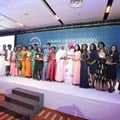Annually, 11 February marks International Day of Women and Girls in Science, highlighting the need for greater gender equality in science-related fields. This year's theme is 'Investment in equality in science, technology and innovation in the digitalisation era for inclusive green growth'.
According to research from the UN Scientific Education and Cultural Organization (UNESCO), only 30% of researchers worldwide are women, and only 35% of all students enrolled in STEM-related (science, technology, engineering and mathematics) fields of study are women. Women in STEM fields publish less, are paid less for their research, and do not progress as far as men in their careers.

Linda Mahlangu, regional metallurgist at Clariant’s Mining Services, Sub-Saharan Africa
Despite the barriers to entry, let alone success, for many women and girls, many are making their mark in the field of science, paving the way for future generations. One such woman is Linda Mahlangu, regional metallurgist at Clariant’s Mining Services, Sub-Saharan Africa.
Tell us a bit about yourself - your background.
Linda Mahlangu: I have a National Diploma in Chemical Engineering from Technikon Witwatersrand. I did my internship at Mintek, in their minerals processing division and upon completion of my diploma, I was then hired as a mineral processing technologist. I worked my way up the ranks to senior level and was responsible for the recruitment as well as the mentoring of interns and junior technicians in minerals processing. I worked there for nine years before joining Clariant in 2011.
Describe your role at Clariant - what does a typical work day look like for you?
Mahlangu: Currently, I am regional metallurgist in the Sub-Sahara Africa region at Clariant. I manage projects from all commodities in the mining sphere and provide technical support in other sub-regions within the EMEA region at Clariant Mining. I am also responsible for the training of new technical employees at Clariant Mining Southern Africa.
A typical day at work would be spent conducting laboratory test work on ore samples from the different mining customers. The purpose of this test is to select and/or develop tailor-made blends of reagents that will improve the grade and recovery of our customers. Because the Clariant range of products are formulated with sustainability in mind, the process of providing mining customers with more sustainable products, is personally very gratifying.
What's the route to becoming a metallurgist - what drew you to this career?
Mahlangu: The normal route to becoming a metallurgist would be to achieve good results in science and mathematics in grade 12, followed by a course in metallurgical engineering or chemical engineering at university level. I was drawn to metallurgy by chance but developed a passion for it early into my career.
Jilana Boston and Andrei Cimpian 12 Jul 2018 As a woman, have there been any significant challenges that stand out for you?
Mahlangu: As a black woman in metallurgy, there are several challenges that one is faced with. Firstly, this is a vastly male-dominated field and, as a woman, you need to double your efforts to prove your capabilities and knowledge. It must also be highlighted that things have changed in the past years as there are several mining companies that have started hiring black women and even promoted them to mining manager levels.
To what do you attribute the low percentage of women in STEM-related sectors globally?
Mahlangu: There is a low number of girls pursuing STEM subjects at school. My assumption is that this is caused by the notion that most students have that these are difficult subjects.
How can we drive greater gender parity in STEM-based industries, particularly in Africa?
Mahlangu: Programmes like Take a Girl Child to Work Day have contributed vastly in raising awareness among young girls. There are other programmes run by the Department of Science and Technology which also help in raising awareness. However, I feel there is a lot of effort that can be made by both the private and public sectors to ensure that these young women are aware of such initiatives.
Where does the value lie in a diverse, inclusive work environment, particularly in terms of female representation?
Mahlangu: I believe the value lies in companies investing in their female employees in terms of offering opportunities to upskill themselves for leadership opportunities within the organisation and not just employing women to increase the numbers. I must commend Clariant in this as we are offered opportunities to upskill and develop further on a regular basis.
Based on your experience, what advice would you give to women pursuing a career in STEM today?
Mahlangu: Work hard, it's not as hard as it seems, but remain true to your passion. Find people who are already in the field to coach you.









































